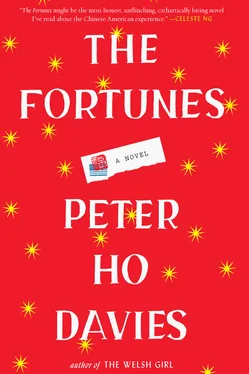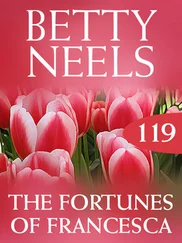“How does every Chinese joke start?” the Captain asked once, and John made the mistake of thinking he was really asking. It went back to the Gold Rush, the building of the transcontinental, he began. But his father’s eyes just glittered with amusement. “By looking over your shoulder!”
How they all started, John decides now, is that some asshole came up with them. An author of sorts, even if they weren’t written down. And yet no one claimed such jokes. They disowned them, rather. Orphans of another sort. Mind you, John has told the hungry-for-power joke himself more than once, whenever anyone has raised the old canard about Chinese food leaving you hungry. I can tell it, he figured, but then that was probably what the Captain thought too. John’s heard a theory somewhere that it’s only true of Chinese American food anyway, a corollary of Westerners not eating enough rice with the dishes. If so, it seems oddly fitting to him, this dissatisfaction, this hunger at the heart of Chinese American life.
He is distracted by movement. Down the corridor, in the opposite direction from his room, a young man in a suit is bowing as if in prayer before each room. Slipping bills under doors, John realizes.
He takes one more look out over the glistering city, the colorfully lit towers crowded together like stacks of poker chips, emblems of the new gold rush, and pushes the call button for the elevator.
He’d pointed out to his mother once that the enemies his father had flown sorties against in Korea were Chinese, but she’d just shrugged. “Different kind of Chinese,” she said. “Mandarin-speakers?” he asked. “No, silly. Communists!”
John understands Nola’s desire to visit Chinatown now in the context of the others in their party, some of whom seem here to adopt not just children but a whole culture. Several are already taking Chinese lessons and speak more of the language than John (though that’s not hard). Others are reading Chinese literature. While they’ve waited for flights he’s seen everything from Pearl Buck (who, Nola has informed him, established the very first adoption program from China, after her first child was diagnosed with a genetic disorder) to The Dream of the Red Chamber, names and titles he recognizes but has never read.
It’s not just the jet lag that has him feeling numbed and out of sync.
Nola tells him it ought to impress him, all this interest in China and the Chinese, and he knows what she means. It’s startling to see so many white people paying attention to China. In junior high, he recalls, kids were shocked that he was Chinese but didn’t come from China, that there were multiple dialects, that China had fought alongside the United States against the Japanese. This latter had especially surprised people who continuously confused Chinese and Japanese, not to mention Koreans and Vietnamese. “They fought with or against all of us in the past fifty years and they still can’t tell us apart. And they wonder why they lost some of those wars,” his friend Ken Takamura used to say. “Shit, they can tell our restaurants apart more easily than us.” When he and Ken had to explain it to other kids at the start of each school year, Ken would roar, “ Orient -ation, Holmes! I’m sushi, he’s chop suey.” But John wasn’t so sure; even now when he heard Chairman Mao referred to as “the Great Helmsman” he pictured Mr. Sulu from Star Trek. “We’re both chopsticks and rice and noodles,” he told Ken. (They were friends, after all — John didn’t have that many — he’d rather emphasize what they had in common.) He didn’t bother pointing out that chop suey was as Chinese as California roll was Japanese. When Ken lost patience he used to tell the white kids, “You nuked my folks; his are going to nuke you. Figure it out.”
The solution, as it turned out, was for Ken’s dad to get a job in Silicon Valley, leaving John as the only Asian in his class. Except back then he was still called “Oriental.”
None of his fellow parents-to-be would make such mistakes now, of course, and he should be happy. It’s social progress, right, albeit their group is hardly representative. And yet it grates a little. He gets the underlying logic, to be sure. They’re doing it for their future children. They want to be able to bring those kids up with a connection to China, feeling proud of their heritage. The idea is that their biological parents may have given them up, may have been obliged to because of the social policies of their government, but there’s still a parent culture they can connect to.
I probably just envy them, John thinks bitterly, but he’s also suspicious of the parents. Isn’t there some liberal guilt at play here? Some disowning of ownership? We’re going to take you away from your home but also keep you connected to it. The Chinese government encourages the idea; so do the adoption agencies. That’s the purported reason why in-country adoptions are required, why these trips include a sightseeing element. “It’s not a vacation, it’s a cultural education,” as Nola has explained it. “And let’s not forget the foreign exchange,” John replied, but that was going too far. Money — the expenses already incurred, and in particular the bricks of fresh bills in their suitcase (China’s being a cash economy, and the Chinese preferring clean bills), which they’ll hand over to the orphanage tomorrow — is off-limits or referred to only euphemistically as a donation, lucky money.
“Well, how do you think they pay for the care of the other orphans?” Nola had snapped at him when he’d tried to articulate his unease. But the “other” orphans are almost as taboo as the question of money. They — all of them — are engaged in a careful calibration of selfishness. It helps that they’re “saving” the children from poverty and lovelessness rather than just filling wants in their own lives, but… what about all those they can’t save?
In the elevator he stares at the panel for a vacant moment, trying to figure out what’s wrong. There’s no fourth floor, no fourteenth, no thirteenth — the number four, si, he recalls, which sounds like the word for “death,” being unlucky in Chinese, the number thirteen omitted for the sake of Western guests. He appreciates the sentiment. And yet as the elevator falls he can’t help imagining those unlucky floors — dark, empty, unfinished — beyond the walls of the elevator shaft.
He knows the adoptees are sometimes known in Chinese as the lucky ones, but as most of the parents are honest enough to acknowledge, they’re the lucky ones.
“Except what if we’re just the rich ones?” John has wondered.
“Oh, don’t get all postcolonial on me,” Nola told him. “I’ve actually read Said.” (Once when he applied for a job that required an interest in postcolonial studies, she’d reassured him, “You don’t need to have studied it, you are it!” He’d always considered himself more of an expert on dis orientalism.)
“ That’s not what’s bugging you.”
“No?”
“No.”
He had dared her to say it… and she’d shrugged. They had to raise a child together, after all. But he knew what she meant.
Once, years earlier, in high school, he’d experimented with being more Chinese. He’d hosted a Chinese New Year’s party. What seventeen-year-old doesn’t want an excuse for a party? Suddenly his Chineseness seemed advantageous. It helped that Chinese New Year that year fell the week of spring break. His father had been on duty, and his mother had helped him prepare and then gone out to celebrate with friends. He made his guests “steamboat,” a hotpot made from a soup base warmed in a rice cooker into which diners added shrimp and meat, dumplings, fish balls, noodles, and vegetables. The noodles were for long life, he explained. He was wearing a musty Mao jacket of his father’s, left over from the Beatles era, which stank more and more of mothballs as the night went on. What about the tofu? a blonde called Helen asked, and he said, “Luck, I think,” not wanting to disappoint her. “What about the shrimp?” she asked. Fertility, he thought, but he wasn’t sure he could tell her that (not when the curled pink shrimp were making him think of a penis), so he offered, “Money, fortune, prosperity.” “Isn’t fortune the same as luck?” someone else asked. They were looking at him a little skeptically now, so when his friend Evan asked with a smirk, “And how about fish balls? They don’t seem so lucky, for the fish at least!” John snapped, “They mean, Fuck you, white boy. ” The table had laughed, but the party hadn’t gone so well — at least, he’d failed to hook up with Helen. Later in school he heard someone call him “Fish Balls” behind his back.
Читать дальше












